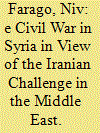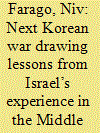|
|
|
Sort Order |
|
|
|
Items / Page
|
|
|
|
|
|
|
| Srl | Item |
| 1 |
ID:
134587


|
|
|
|
|
| Summary/Abstract |
On November 24, 2013, after nearly two-and-a-half years of significant economic pressure on Iran by the United States and Europe, the two sides reached a Joint Plan of Action for six months (also referred to as the interim agreement). The agreement entered into force on January 20, 2014, and was extended for a period of four months in late July 2014.1 In return for a temporary and partial suspension of the American and European economic sanctions that had been imposed on it, Iran agreed to constrain its nuclear activity. Thus, Iran pledged to suspend its 20 percent uranium enrichment, convert half of its stockpile of 20 percent enriched uranium to oxide, and to dilute the other half to no more than 5 percent. Iran also agreed to refrain from installing additional centrifuges and increasing its stockpile of uranium enriched up to 5 percent by converting newly enriched uranium to oxide. Moreover, Iran consented not to transfer fuel or heavy water to the Arak nuclear site, to halt construction work on the site, and not to build a reprocessing facility capable of producing plutonium as a by-product.2
|
|
|
|
|
|
|
|
|
|
|
|
|
|
|
|
| 2 |
ID:
167952


|
|
|
|
|
| Summary/Abstract |
This article examines the civil war in Syria and Iran’s military buildup in that
country through the lens of senior Israeli politicians, military officers, and security
pundits. Most of them agree that the Netanyahu government’s policy of striking
Iran–linked targets in Syria hard while encouraging Europe to impose, like the
United States, debilitating sanctions on Iran has severely damaged the ayatollahs’
plans. By interrupting Iranian efforts to establish a Hezbollah-like force in Syria
and equip it with precision-guided missiles, Israeli policy has also decreased, some
pundits believe, the likelihood of regional war. However, this article suggests that
although Israel’s policy has hindered Iranian entrenchment in Syria, the danger of
regional war has increased. Debilitating sanctions could cause Iran to discard the
2015 nuclear deal, thereby provoking an Israeli strike on its nuclear installations,
and increasingly bolder strikes in Syria may spur the ayatollahs to retaliate harshly.
Reliant upon Iran to secure Assad’s victory, but determined to deny the ayatollahs
control over Syria, Russia is allowing Israeli strikes to continue as it rehabilitates
Assad’s forces and rearms them with advanced weaponry. This weaponry, including
S-300 defense systems that threaten Israeli planes, could embolden Syria to attempt
recapturing the Golan Heights in the future.
|
|
|
|
|
|
|
|
|
|
|
|
|
|
|
|
| 3 |
ID:
156482


|
|
|
|
|
| Summary/Abstract |
In recent years, prominent voices in the Israeli academic and political arenas have
increased their criticism of the Israeli Defense Force’s (IDF) dominant role in policy
and decision-making processes in the country. The 1967 Six–Day War is perhaps
the bedrock upon which IDF critics’ fears of a dominant military rest upon. They
disapprove of the pressure that the military’s high command put on the government
to go to war and argue that the IDF was overly dominant in determining its
goals and strategic moves on the battlefield. The following analysis debunks the
claims of IDF critics by presenting historical evidence that shows how political
considerations overrode military calculations on the way to and during the war. It
also highlights the vital contribution of the IDF’s high command to decision-making
at significant crossroads. In this regard, the analysis uses organizational theory logic
to question the suggestion of IDF critics to empower the National Security Council
(NSC) so it could provide the government with alternative analyses and courses
of action to those suggested by the IDF. Significantly, the analysis concludes
that by empowering the NSC at the expense of the IDF, the government might
invite confusion rather than clarity and efficiency to policy and decision-making
processes, especially in times of crises and war—when quick decision and action
are necessary.
|
|
|
|
|
|
|
|
|
|
|
|
|
|
|
|
| 4 |
ID:
143689


|
|
|
|
|
| Summary/Abstract |
What would an armed conflict between the two Koreas look like? The following analysis examines this question by drawing lessons from the history of military clashes between Israel and its Arab and Palestinian adversaries. Firstly, it suggests that an armed conflict on the Korean Peninsula would be limited in its scope. Although qualitatively inferior, the North Korean military could conduct a limited ground maneuver south to the DMZ by employing Egypt’s strategy in the 1973 Yom Kippur War. A South Korean counterattack would also be limited. Advancing too deep beyond the DMZ would provoke Pyongyang to go on a nuclear alert and encourage Chinese and American pressure on Seoul to pull back. A South Korean refusal to comply could invite foreign intervention, similar to the American intervention in the 1973 War. Secondly, this paper explores the challenge of guerrilla warfare (both above and below ground) that ROK forces are likely to encounter if they cross the DMZ. Israel’s experiences in the 2006 Lebanon War and in Operations Cast Lead (2008) and Protective Edge (2014) illustrate that in facing such a challenge, even an indisputably superior force may have to pay a heavy price in casualties. Given that North Korean nuclear deterrence would prevent ROK forces from implementing reunification war plans, South Korea should consider stopping its counterattack at the DMZ, rather than pursuing the enemy into a terra incognita of topographical and subterranean traps.
|
|
|
|
|
|
|
|
|
|
|
|
|
|
|
|
| 5 |
ID:
180308


|
|
|
|
|
| Summary/Abstract |
For two decades, successive US administrations have overplayed the importance of pressure tactics and Chinese support for denuclearizing North Korea. However, the continued development of North Korea's nuclear and missile programs reflects not only gridlock in US-North Korea relations, but also Pyongyang's growing suspicions over China's commitment to the Kim regime. By supporting and enforcing tougher sanctions, Beijing has only reinforced North Korean distrust and concern. At the same time, realizing that excessive pressure on a nuclear North Korea might result in a cataclysmic regional crisis, China has been careful not to push the Kim regime into a corner. Apparently, China is not as valuable an asset to the United States on North Korea, as some believe. Instead, the Biden administration should engage the Kim regime, focus on trust building, and aim for a step-by-step nuclear deal in which freezing and gradual disarmament are commensurate with sanctions relief and eventual normalization.
|
|
|
|
|
|
|
|
|
|
|
|
|
|
|
|
| 6 |
ID:
169596


|
|
|
|
|
| Summary/Abstract |
As a result of trilateral negotiations involving Libya, Britain and the United States, Libyan leader Muammar al‐Qadhafi decided on December 19, 2003, to abandon his country's weapons‐of‐mass‐destruction (WMD) programs. The first George W. Bush administration attributed the dismantlement agreement to a consistently applied policy of sanctions and isolation throughout the 1980s and 1990s.2 A few years later, Ambassador John Bolton and hardline neoconservatives, who espoused the implementation of a similar policy towards North Korea, criticized the second Bush administration for prematurely easing pressure on Pyongyang
|
|
|
|
|
|
|
|
|
|
|
|
|
|
|
|
| 7 |
ID:
148457


|
|
|
|
|
| Summary/Abstract |
More than two decades of nuclear dialogue between the United States and North Korea have not prevented Pyongyang from conducting four nuclear tests and building up a nuclear weapons arsenal. Putting the blame for the failure of this dialogue solely on Pyongyang ignores the hesitancy and confusion of US policy. Historical evidence suggests that the Clinton, Bush and Obama administrations consistently failed to prioritize their objectives and adopted an impatient and uncompromising negotiating strategy that contributed to this ongoing non-proliferation fiasco. Identifying US policy mistakes at important crossroads in the dialogue with Pyongyang could help to prevent similar mistakes in the future. In this regard, the following analysis suggests a new approach towards Pyongyang based on a long-term trust-building process during which North Korea would be required to cap and then gradually eliminate its nuclear weapons in return for economic assistance and normalization of relations with the United States. Importantly, the United States might have to resign itself to North Korea's keeping an independent nuclear fuel cycle under supervision of the International Atomic Energy Agency, as well as to accepting South Korea's request to independently enrich uranium and pyroprocess spent nuclear fuel. This would be a more favourable alternative to allowing North Korea to continue accumulating nuclear weapons. Moreover, if the United States continues on the Obama administration's failed policy path, then there is a better than even chance that the Korean Peninsula may slide into a nuclear arms race.
|
|
|
|
|
|
|
|
|
|
|
|
|
|
|
|
|
|
|
|
|